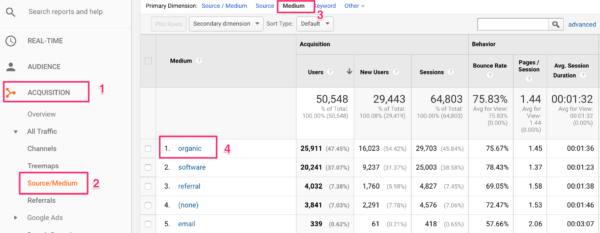Enhance Your Information Analysis Utilizing Secondary Measurement in Google Analytics
Checking out the capacities of additional measurements in Google Analytics opens up a world of opportunities for refining information analysis. By layering extra dimensions onto main information sets, a more elaborate story emerges, shedding light on user communications and efficiency signs.
Recognizing Second Measurements
In the realm of information analysis, an important facet to grasp is the principle of second measurements and their value in extracting deeper insights from Google Analytics records. Secondary dimensions in Google Analytics describe additional criteria that can be included to the primary measurement, allowing for a more in-depth evaluation of data. By integrating second measurements, experts can sector and filter information to reveal patterns, trends, and relationships that could not appear when looking at the information in its entirety. These secondary measurements can supply context and a much more thorough understanding of individual actions, web traffic sources, and other vital metrics tracked by Google Analytics.

Benefits of Utilizing Additional Dimensions
When assessing data in Google Analytics, the application of second dimensions uses invaluable understandings right into user actions and efficiency metrics. By adding a secondary dimension to your key data, you can dig deeper into the characteristics of your web site visitors and their communications.
In addition, second measurements assist in recognizing patterns and connections that might not be right away noticeable when taking a look at the data in isolation. This much deeper level of analysis can reveal important details that can guide advertising and marketing techniques, web site optimization, and total business decisions. Additionally, secondary measurements boost the context of your key information, giving a more extensive view of individual engagement and performance metrics. On the whole, the usage of second measurements in Google Analytics can dramatically enhance the deepness and top quality of your information evaluation, resulting in more educated decision-making and enhanced outcomes.
Exactly How to Add Second Dimensions
By including second dimensions in Google Analytics, individuals can get much deeper insights into their data evaluation process, allowing for more detailed analysis of individual actions and efficiency metrics. Including secondary dimensions is a straightforward procedure that can substantially enhance the depth of analysis. When in the record, situate the "Secondary dimension" tab over the information table.
Analyzing Data With Additional Measurements
Using additional dimensions in data evaluation supplies an extra comprehensive understanding of user behavior and efficiency metrics. By adding a second measurement to your primary data embeded in Google Analytics, you can dig much deeper into the features of your site visitors and their communications. Incorporating the primary dimension of 'source/medium' with the secondary measurement of 'touchdown page' can expose which certain pages are bring in traffic from different sources, helping you optimize these web pages this contact form for far better involvement.

Fundamentally, analyzing information with additional dimensions encourages you to acquire useful understandings right into individual actions, recognize fads, and make notified choices to enhance the efficiency of your electronic properties.
Best Practices for Second Dimensions
In data analysis, incorporating additional dimensions effectively can significantly enhance the deepness of understandings originated from metrics and individual behavior patterns. When using second measurements in Google Analytics or any kind of other logical tool, it is critical to abide by best techniques to guarantee the accuracy and relevance of the information analysis.
One key ideal practice is to very carefully choose second dimensions that complement the main measurement being analyzed. Selecting second measurements that provide additional context or further segmentation can supply a more extensive understanding of the information. It is additionally vital to stay clear of overcomplicating the analysis by including way too many secondary measurements, which might result in complication or dilution of understandings.
Additionally, it is recommended to experiment with different combinations of additional and main dimensions to reveal new relationships and trends. Frequently examining and improving the selection of secondary dimensions based upon the certain objectives of the analysis internet can bring about more actionable insights. By complying with these ideal methods, information experts can utilize secondary dimensions effectively to improve the total data evaluation process and decision-making capabilities.

Verdict
In conclusion, incorporating additional measurements in Google Analytics is important for a thorough data analysis method. By leveraging second dimensions alongside key ones, analysts and marketers can uncover valuable understandings and relationships that can educate decision-making and enhance electronic advertising approaches. Recognizing how to successfully make use of you can find out more second dimensions and following ideal techniques will permit experts to remove meaningful information and boost their general efficiency metrics.
Additional dimensions in Google Analytics refer to additional criteria that can be added to the main dimension, permitting for an extra in-depth evaluation of data. By integrating secondary measurements, experts can segment and filter data to discover patterns, patterns, and connections that could not be apparent when looking at the information as a whole. Incorporating the main measurement of 'source/medium' with the second measurement of 'touchdown page' can disclose which certain web pages are attracting traffic from various resources, assisting you optimize these pages for better engagement.
One trick finest practice is to thoroughly choose additional measurements that match the main dimension being examined. By complying with these ideal methods, information analysts can leverage additional measurements effectively to enhance the overall data analysis process and decision-making capabilities.
Comments on “Step-by-Step Guide: Leveraging Secondary Dimension in Google Analytics”